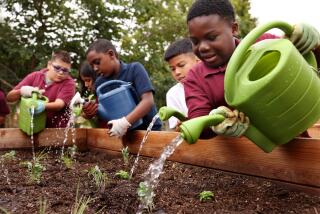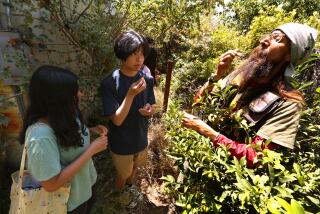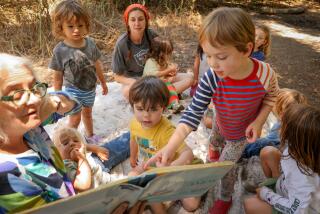Project Friendship
If the lessons of bigotry and hatred are picked up at an early age, then it also holds true that the young are capable of learning the values of tolerance and understanding.
Staff members of the 4-H After School Activity Program have seen the kinds of problems that develop between children who live in racial isolation in the cityâs housing projects.
To ease tensions, they are planning a series of retreats this summer designed to help children from different backgrounds develop bonds of friendship. They hope such encounters will help the young learn how to avoid confrontations.
âWe want to see them reaching out to each other,â said Pat Gibson, one of the coordinators for the 4-H program, a nonprofit organization sponsored by the University of California Cooperative Extension. âWe donât want them to grow up angry [at others]. We want them to see and understand that people are different, with different cultures.â
The program will be kicked off later this month when about 50 children from four housing projects team up to confront their differences and clean beaches in a daylong event sponsored by the Santa Monica-based Heal the Bay organization.
Participants from Heal the Bay will teach the children, ages 7 to 13, why they need to develop friendlier relationships with their environment. Taking care of the beaches, they point out, is the responsibility of everyone, even those who live miles away from the seashore in the inner city.
âThe beach really starts in their neighborhoods,â said Alix Gerosa, a spokeswoman for Heal the Bay. âWhen it rains, whatever winds up on the street gets washed down the storm drains and ends up in our bay.â
The beach is a resource that should be enjoyed by everyone, she said.
During the dayâs events, the children will remove trash from the beach and take part in an assortment of activities designed to encourage teamwork and cooperation. There will also be free rides on the Santa Monica Pier, free ice cream and group discussions.
Earlier this week, about a dozen children at Pueblo del Rio housing project in South-Central Los Angeles received a head start on the retreat when 4-H organizers dropped by their recreation room to talk about the problem of pollution. The experiment they performed--a chance to get dirty--got everyoneâs attention.
The children were told to put oil, dirt, food wrappers and other bits of trash into a plastic tub filled with water. Then they were asked to remove the sludge with paper towels, cotton, filters and even their hands.
âItâs messy,â exclaimed Tiffany McGrew, 11, her hands dripping with mud and oil. âWhat we need is a brand new ocean.â
Edwin Alejandres, 10, got the message. âA lot of animals live in the ocean,â he said. âIf we pollute, they will die.â
Program administrator Keisha Brown said the exercise was designed to bring the children together and demonstrate the dangers of polluted waters.
âIt becomes unsafe to swim in,â she said. âIt kills the fish.â
The game broke down any reluctance the African American and Latino children had to mixing among themselves, encouraging them to ignore their differences in the name of fun.
Eventually, Brown hopes to try other experiments, such as handing out cameras to the children and asking them to role-play as if they were members of a different ethnic group. The exercise aims to expose stereotypes as a way to tear them down.
The group hopes that these and other positive experiences will build self-esteem and self-confidence among children. And maybe, Brown adds, more parents will become involved with their children, perhaps taking them to the beach--something some have never done.
*
At Pueblo del Rio, all of the children raised their hands when asked whether they had been to the beach. âI have, but it has been a long, long time,â said Jamar Sneed, 5. âI really donât remember.â
At the recreation room door stood Shirley Williams, a mother of four, watching over the group as her children played in the water, mud and oil.
âThese programs keep the children out of trouble,â she said. âThey learn something, and they are around children of different backgrounds. Thatâs good.â
Williams said any conflicts over race are not of the childrenâs making.
âKids are going to be kids. They are going to play,â she said. âItâs the grown-ups who have the problems.â
(BEGIN TEXT OF INFOBOX / INFOGRAPHIC)
The Beat
Todayâs centerpiece explores the 4-H After School Programâs efforts to encourage ethnic sensitivity among children from housing projects in South-Central and on the Eastside. For information, (213) 744-5139.
More to Read
Sign up for Essential California
The most important California stories and recommendations in your inbox every morning.
You may occasionally receive promotional content from the Los Angeles Times.










